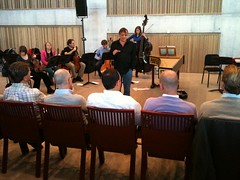On how Music is a vehicle to travel beyond the things we take for granted about leadership and why it is not a good idea to pour salt in your coffee.
So we did it again. Jos van Immerseel, the outstanding instrumentalists and singers of Anima Eterna Brugge, the executive committee of a large bank, and us – BiZZarts explorers of the metaphor of music.
This must be the fifth time that we make the crossover between two worlds: the world of leadership and that of music. The discoveries we did were – once again – amazing.

Jos van Immerseel shaping the story
(click to enlarge)
Evesdropping a rehearsal of this renowned orchestra is always a unique experience. The focus and dedication of the musicians creates an unbelievable momentum. From the moment that the first note is played you feel like being on a spaceship taking off. You have to experience it live to believe it. Music is the vehicle.
Metaphor
To understand what this travel is about, have a look at the below video of Leonard Bernstein. In the below video Bernstein explains his passion through the expressivity of music and the ability of people to respond to that.
He talks about music as a sense-making language, a compelling story that communicates things that are beyond your reach. Later, he adds:
It is metaphor that most produces knowledge.
Metaphor is the powerplant of poetry and music. It can name the unnamable and communicate the unknowable.
When we have a closer look at the origins of the word metaphor we see that it is composed of two parts:
- ‘Meta’, which is the Greek word for ‘beyond’, and
- ‘Phore’, which originates from the Greek word pherein, meaning: ‘to carry‘
When we say that music is a metaphor it means that music can carry meaning beyond the literal and the tangible. In other words, music is a vehicle that allows us to discover things that we are unable of articulating and knowing otherwise. This may explain the lifting sensation of a rehearsal.
So what exactly did the rehearsals of last Tuesday allow us to travel beyond?
Beyond Charted Territory
The No Man’s land that I mentioned in last week’s post was very tangible during the rehearsals. This is where the conductor and the musicians constantly dialogued and finetuned, all the while respecting one another’s area of expertise. After all, they are exploring uncharted territory.
We could see how van Immerseel was building context by reminding the musicians of the story and the intent of Monteverdi’s play. At the same time he was allowing the musicians the space to tap into the secrets of their instrument. As a result, the dialogue consisted of the musicians suggesting different options to get as close as they could to the intent of the composer.
Later, van Immerseel revealed that conducting is a double balancing act:
On the one hand I need to balance the No Man’s Land by respecting the musicians. On the other hand I need to be in service of the composer by ensuring we get as close as we possibly can to the original form as it was intended.
To put it in the words of Jeff Jarvis‘ book What Would Google Do? (one of the major business books of the past years – just my humble opinion), van Immerseel gets to practice the principle of ‘Getting Out Of The Way‘, that I mentioned earlier in this series.
Evesdropping on sacred moments
(click to enlarge)
The surprising part is that the rehearsals made it clear that ‘getting out of the way‘ does not equal ‘disappearing into the background‘. In van Immerseel’s case it means committing to the relationship with the musicians by feeding the story and the context instead of being right.
On the other hand it means making a case for the original composer by turning down suggestions for contemporary interpretations of the piece. Getting out of the way is an active thing, as van Immerseel explained:
A leader who says “let’s have a vote” is not leading but avoiding his responsibility.
Beyond Darwinism
Jos van Immerseel takes the respect for the original composer very serious. He warns against the popular stream of interpretations:
You wouldn’t put salt in your coffee, would you? Coffee allows for sugar or another sweetener. Yet, in the world of music it has become mainstream to add salt and to applaud the genius who came up with the original idea of adding salt.
It gets more interesting from a leadership point of view, as he takes this argument even a step further:
Art needs to be liberated from a Darwinist mindset. We need to accept that there is no progress in art. Bach is no better than Monteverdi. Picasso is no better than Carravagio. They are different, not better.
As a thought experiment, consider what would happen if we would be liberated from a Darwinist mindset: Kennedy is no better leader than Alexander the Great. The new CEO is no better than the previous one.
Or let’s assume that the latest model on leadership of Harvard Business School is no better than Taylorism in the dawn of the Industrial Revolution. They are different because they respond to a different context and timeframe.
As a result we may end up with a more complete view of leadership – one that does not discriminate. Different. Not better.


